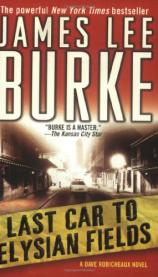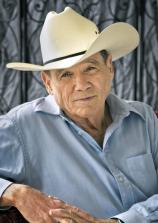Last Car to Elysian Fields
Review
Last Car to Elysian Fields
The creation of a successful character is a blessing and a curse for a writer. If the character is successful and the accolades are long and loud, there is a temptation to bring him back again, and again, and again. If you change him too much, the audience may go elsewhere; but if you don't change him at all, then the character tends to become boring. James Lee Burke has tinkered almost continuously with David Robicheaux since his inception, while keeping his core character true.
Robicheaux is a flawed man, and dangerously so. A recovering alcoholic with a position in law enforcement and an almost pathological hatred for the rich, he is a roiling combination of dangerous emotions that play off of each other, and he struggles --- not always successfully --- to keep himself in check. Burke, from almost the beginning of LAST CAR TO ELYSIAN FIELDS to its end, makes some major changes in Robicheaux's life that will almost certainly influence the events of at least the next few novels in the series.
As the title would indicate, LAST CAR TO ELYSIAN FIELDS returns Robicheaux to New Orleans. Elysian Fields is not a place, but a street --- one that has its origins by the Mississippi River and its end close to Lake Ponchetrain. It bisects New Orleans; one can travel the entire street in under a half-hour and see some of the best and worst of the city in the same amount of time. The title comes from a chance remark made by a minor character in the novel, but is nonetheless a metaphor for what is to come.
LAST CAR TO ELYSIAN FIELDS opens with Robicheaux seeking to settle a score --- and violently so --- on behalf of his friend, Father Jimmie Dolan. Robicheaux and his friend Clete Purcel confront Dolan's tormentor in an Uptown bar. The evening ends with Purcel in jail and Robicheaux warned to stay out of New Orleans. Meanwhile, there is trouble waiting for Robicheaux in his home of New Iberia. Three teenage girls are killed in an accident in which alcohol was a factor --- alcohol purchased by the girls at a drive-through daiquiri shop. When the owner of the shop is brutally murdered, Robicheaux suspects that the father of one of the girls, himself a prominent physician, is the murderer. Yet the trail seems to lead away from him. And when Dolan asks Robicheaux to investigate the presence of a toxic landfill near New Orleans, the answers seem to lie in both the past and present. The past concerns a legendary bluesman who disappeared decades before, while the present involves a coldly maniacal assassin named Max Coll, summoned to New Orleans to murder Dolan. Robicheaux finds that his investigation and duty lead back to New Orleans, where he must confront not only the troubles of his friends but the darkness of his own unruly past.
Although Burke's prose often deals graphically with violence and its sordid byproducts, his descriptive powers remain poetic, particularly when he deals with the beauty of nature and the darkness within men's souls. Burke, well into his second decade of chronicling Dave Robicheaux, continues to dazzle and amaze, while hinting that he has much more to reveal. LAST CAR TO ELYSIAN FIELDS is a tale to savor.
Reviewed by Joe Hartlaub on January 22, 2011





